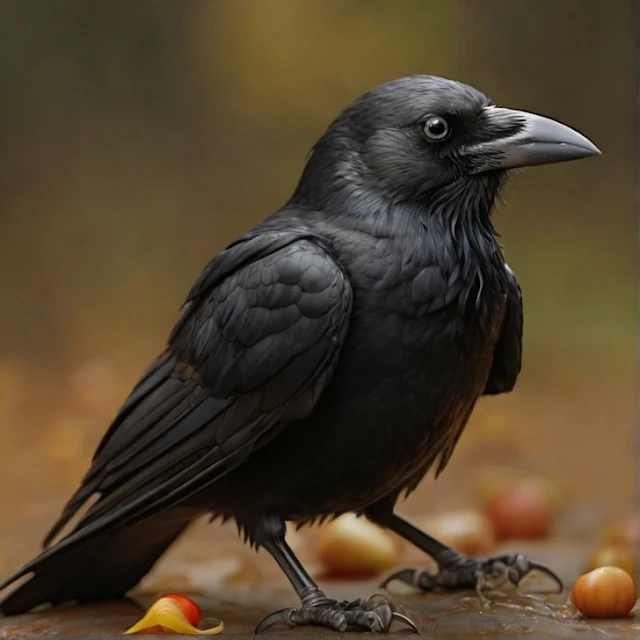The Intriguing World of Crows: Nature's Intelligent Avian Wonders
Crows, often overlooked in the avian world, possess an intelligence that sets them apart. In this exploration, we delve into the intriguing world of crows, uncovering their remarkable cognitive abilities and the unique role they play in both nature and human societies.
The Intelligence of Crows
Crows are renowned for their exceptional intelligence, comparable to primates and dolphins. Their brains, relative to body size, are surprisingly large, allowing them to exhibit advanced problem-solving skills. Researchers have observed crows using tools, solving puzzles, and even recognizing themselves in mirrors.
Crows in Mythology
Throughout history, crows have held symbolic significance in various cultures. From being messengers of the gods in Greek mythology to playing a central role in Native American folklore, these birds have captivated human imagination for centuries.
The Complex Social Structure
Crows live in intricate social groups with hierarchies and complex communication systems. Their ability to work collaboratively within a group showcases a level of organization and understanding that is truly fascinating.
Remarkable Problem-Solving Skills
Studies have shown that crows can solve problems that stump other animals. They've been observed using tools to extract insects from bark, demonstrating a level of cognitive flexibility that challenges traditional notions of avian intelligence.
Crows and Tools
One of the most astonishing aspects of crow behavior is their use of tools. Crafting hooks from twigs to extract insects or using cars to crack open nuts, crows showcase an impressive understanding of cause and effect, a trait rarely seen in the bird kingdom.
Communication Among Crows
Crows communicate using a sophisticated language of calls and gestures. Researchers have identified specific calls for different situations, from warning of predators to coordinating group activities. This intricate communication system highlights their social cohesion and collective problem-solving abilities.
Adaptability to Urban Environments
Unlike many bird species, crows thrive in urban settings. Their adaptability and ability to find food sources in diverse environments contribute to their success in coexisting with humans.
Crow Species Diversity
The world of crows is diverse, with various species inhabiting different regions globally. Each species has unique characteristics and behaviors, adding to the complexity and richness of the crow family.
Crows and Human Interaction
Crows often share spaces with humans, sometimes leading to conflicts. Understanding how to coexist with these intelligent creatures is crucial to maintaining a harmonious balance in shared environments.
The Role of Crows in Ecosystems
Beyond their interactions with humans, crows play a vital role in ecosystems. Their scavenging behavior helps maintain cleanliness, and they contribute to seed dispersal, influencing plant growth and biodiversity.
Challenges Faced by Crows
Despite their intelligence, crows face challenges such as habitat loss, pollution, and even persecution by humans. Recognizing these challenges is essential for fostering a sustainable coexistence.
Conservation Efforts
Several initiatives aim to protect and conserve crow populations. These efforts focus on preserving natural habitats, educating the public about the importance of crows, and addressing the challenges posed by human activities.
Fun Facts About Crows
- Crows can recognize human faces, remembering both positive and negative interactions.
- Some species of crows are known to use cars to crack open hard nuts by dropping them on roads and waiting for vehicles to crush them.
- Crows are highly territorial and can remember specific locations of food caches, helping them survive in challenging environments.
Conclusion
In conclusion, the world of crows is filled with marvels and mysteries. Their intelligence, social structure, and adaptability make them truly remarkable avian wonders. As we continue to coexist with these birds, it's essential to appreciate their role in ecosystems and work towards fostering a harmonious relationship.
FAQs
Do crows mate for life?
- Crows are known for forming strong pair bonds, and in many cases, they do mate for life.
Are crows considered pests in urban areas?
- While some people may view them as pests due to their scavenging habits, crows play a valuable role in urban ecosystems.
Can crows recognize individual humans?
- Yes, studies have shown that crows can recognize and remember human faces.
Why do crows use tools?
- Crows use tools as a way of solving problems and obtaining food. This behavior demonstrates their high level of intelligence.
How can we contribute to crow conservation?
- Supporting conservation initiatives, avoiding harmful practices, and raising awareness about the importance of crows are ways individuals can contribute to their conservation.



